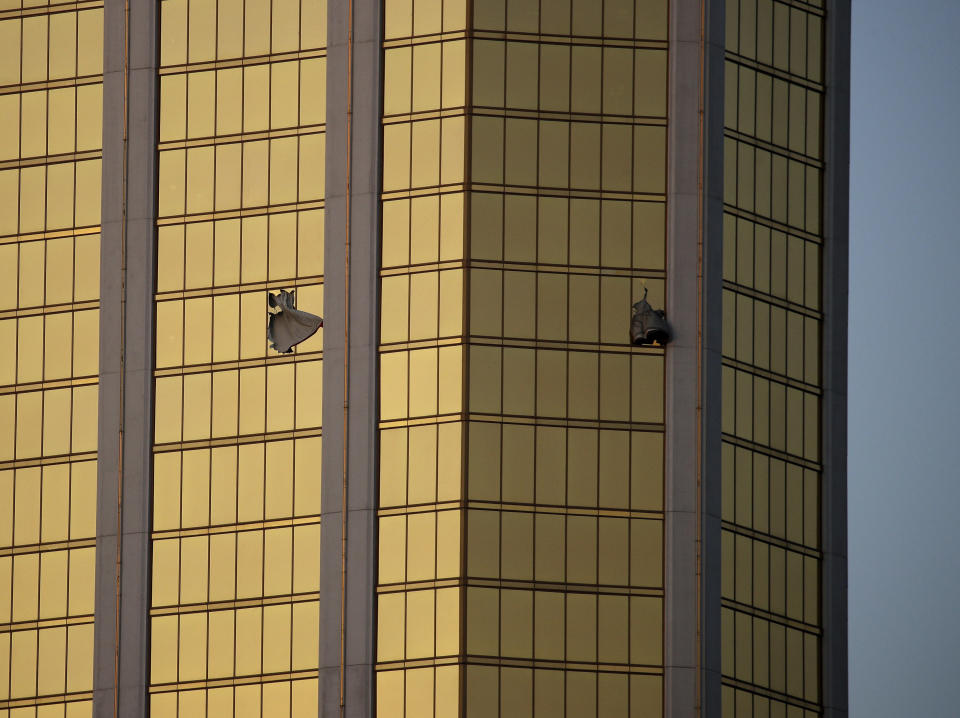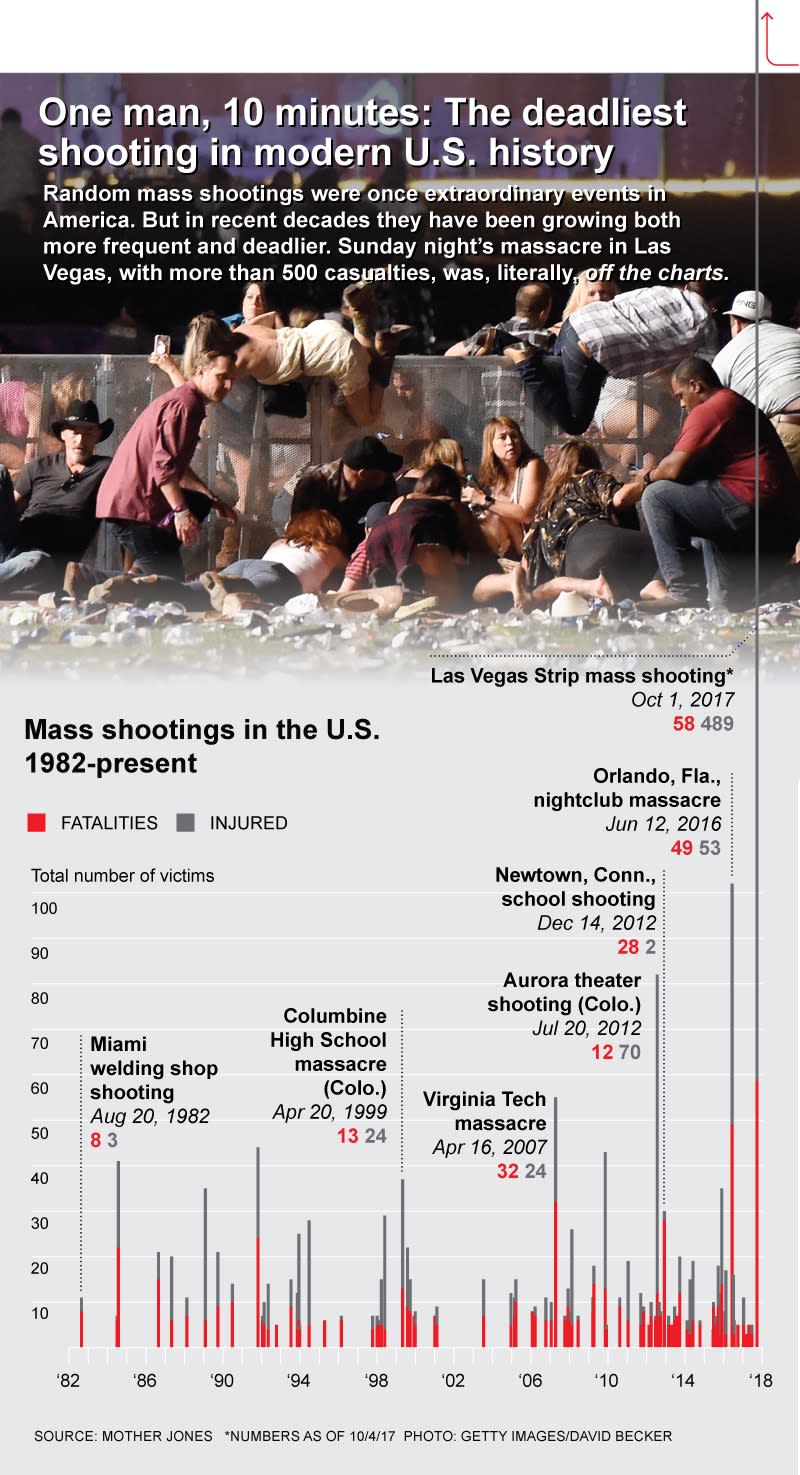What will happen to the Las Vegas shooter's suite at Mandalay Bay?

If you look up at the Mandalay Bay Casino and Resort from the Las Vegas Strip, you will see the two blown-out windows on the 32nd floor. These served as sniper’s perches for the deadliest mass shooting in modern U.S. history.
Authorities say Stephen Paddock, of Mesquite, Nev., booked Room 32135 — a large suite with uninterrupted views of the iconic Strip — last Thursday. Now those expansive windows show the vantage points of a man who killed at least 58 people and injured nearly 500 at a music festival being held across the street on Sunday night. Police found a trove of 23 firearms and the gunman’s body inside.
With the investigation ongoing, it is still far too early for MGM Resorts International, the hospitality company that owns and operates the luxury resort and casino, to comment publicly about what will become of the room Paddock booked.
“Security continues to be a top priority at all of MGM Resorts as our Security team is working tirelessly to protect the safety of our guests and facilities,” MGM Resorts spokesperson Debra DeShong said in a statement.
“MGM Resorts works consistently with local and national law enforcement agencies to keep procedures at our resorts up to date, and are always improving and evolving,” DeShong added. “We continue that close working relationship now during the ongoing investigation into this tragic incident.”

Sunil Atreya, an associate professor at the College of Hospitality Management at Johnson & Wales University, has worked in management for the Welcome Group Chain of hotels in India, as well as the Marriott and Holiday Inn in the U.S. Based on his experience, he said, the room will be gutted, refurbished and renumbered, at a minimum — or transformed into something else, such as storage space or a boardroom. He suggested that Mandalay Bay would likely refurbish the entire floor.
“For people to go on — whether it be survivors, the families of the victims or employees — something has to happen so that that room does not stay as a reminder of this heinous act that took place in our country,” Atreya told Yahoo News.
He said guests on the 32nd floor have likely been moved, or are in the process of being moved, to other rooms so that the entire floor can be blocked off — but also said that something else needs to be handled immediately.
“What is extremely important for them to do right now is repair those windows. As long as those windows are gaping open, it’s a reminder of the event,” Atreya said.
In the past, hotels have taken pains to make sure that rooms where people died do not become objects of morbid curiosity or reminders of something awful.

The Beverly Hilton hotel in Beverly Hills, for example, temporarily took suite 434 out of rotation in February 2012 after acclaimed singer Whitney Houston was found dead in the accommodation’s bathtub. A hotel representative told “Inside Edition” that they completely refurnished and redecorated the suite, removing all original content, out of respect for Houston and her fans.
Atreya said the Days Inn in Corpus Christi, Texas, where Tejano singer Selena was murdered in 1995, responded in a similar fashion: “In both situations, the rooms were refurbished and the room numbers were changed.”
Hotels are not the only places to encounter this kind of problem. After a tragedy, questions linger about what should be done to secure visitors’ safety and best respect the victims.
The owners of Pulse Nightclub in Orlando started the onePULSE Foundation to transform the gay bar and dance club into a memorial site and museum to honor the victims of what had been the deadliest mass shooting in U.S. history — until last weekend. Omar Mateen killed 49 people and wounded 53 others in June 2016.
The University of Texas at Austin had to respond to a shooting in August 1966 that the tragedy in Las Vegas echoed. Charles Whitman killed 17 people and wounded more than 30. He murdered several people before reaching the observation deck of the school’s clock tower, where he fired down at people below. Afterward, the tower was closed, but it was reopened two years later. It was closed again in the mid-’70s after several suicides. In 1999, it was reopened for guided tours after security features were installed.

The sixth floor of the Texas School Book Depository in Dallas is known for being the vantage point from which Lee Harvey Oswald assassinated President John F. Kennedy in November 1963. The company moved out of the building in the 1970s, and it remained vacant until Dallas County acquired it for municipal purposes. The sixth floor was transformed into a historical exhibition, the Sixth Floor Museum, which focuses on the impact of Kennedy’s death on the U.S.
Another icon of 1960s change, civil rights leader Martin Luther King Jr., was assassinated in 1968 outside room 306 at the Lorraine Motel in Memphis, Tenn. The room was pulled from circulation and maintained as a memorial to the late American hero, but the motel struggled financially and went into foreclosure in the early 1980s. The Martin Luther King Memorial Foundation was founded with the sole focus of saving the motel, and ultimately transformed it into the National Civil Rights Museum, which officially opened to the public in 1991.
Other sites have been completely demolished after national tragedies. The Connecticut home where school shooter Adam Lanza shot and killed his mother in December 2012 was destroyed so the land could be returned to its natural state. Residents of Newtown, Conn., also voted to demolish Sandy Hook Elementary School — where Lanza shot and killed 20 young schoolchildren and six staff members — in one of the deadliest school shootings in the nation’s history.
The children attended a different school while a new school building was constructed. Sandy Hook Elementary School reopened to the public in the summer of 2016.
Expensive so-called murder houses can go unoccupied for years. After murders — especially high-profile cases — houses can be hard to sell and are therefore dramatically underpriced. Many wind up being demolished, but sometimes people move into them because of — not in despite of — their grisly histories.

In the murder spree that some say ended the 1960s, members of the Manson Family killed actress Sharon Tate — who was eight months pregnant — and several visitors in the luxury home she and her husband, director Roman Polanski, rented at 10050 Cielo Drive in Beverly Hills. Afterward, the home was occupied by various celebrities, including musician Trent Reznor, who even filmed a music video there. He told Rolling Stone in 1997 that Tate’s sister had asked if he was exploiting her sister’s death by living there.
“I guess it never really struck me before, but it did then. She lost her sister from a senseless, ignorant situation that I don’t want to support,” Reznor told the music magazine. “When she was talking to me, I realized for the first time, ‘What if it was my sister?’ I thought, ‘F*** Charlie Manson.’ I don’t want to be looked at as a guy who supports serial-killer bulls***.”
The home was demolished in 1994, and a new house was built in its place. The address was changed to 10066 Cielo Drive. This is similar to what Atreya, the hospitality professor, suggested will likely happen to the suite Paddock turned into a sniper’s nest.
“It is a reminder of a very tragic event in American history,” Atreya said.

_____
Read more from Yahoo News:
A surreal scene as Las Vegas returns to business after Sunday massacre
Las Vegas casino workers recognize Stephen Paddock: ‘I wish I had never seen his face’
Las Vegas investigation focuses on Paddock’s finances and travel: Sources
Photos: Makeshift memorials pay tribute to Las Vegas shooting victims
Photos: The front page: How newspapers portrayed the Vegas massacre


